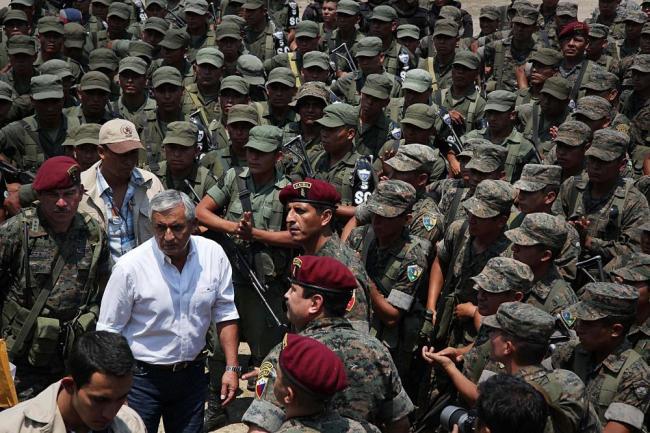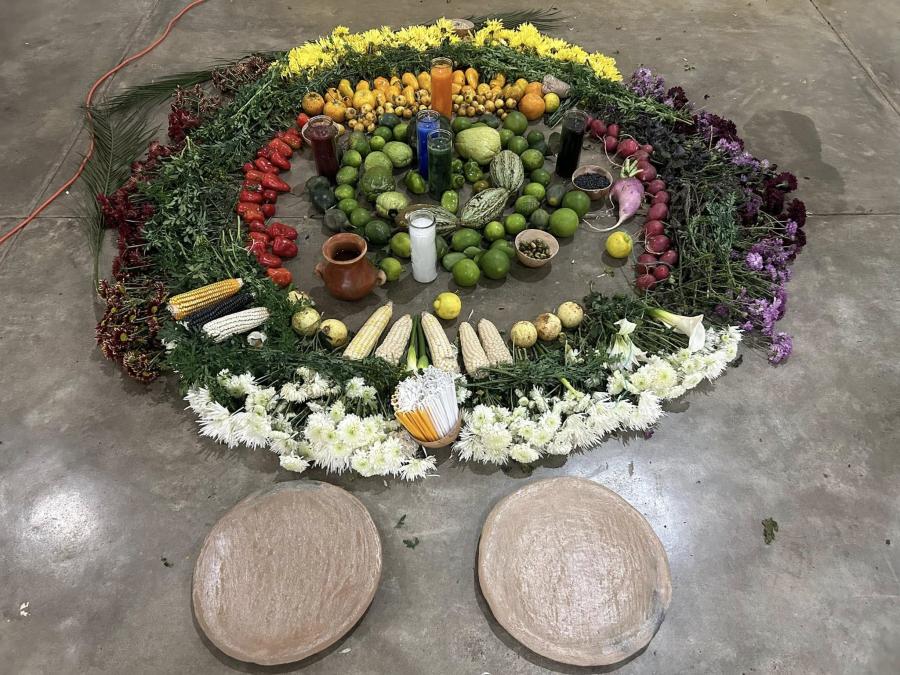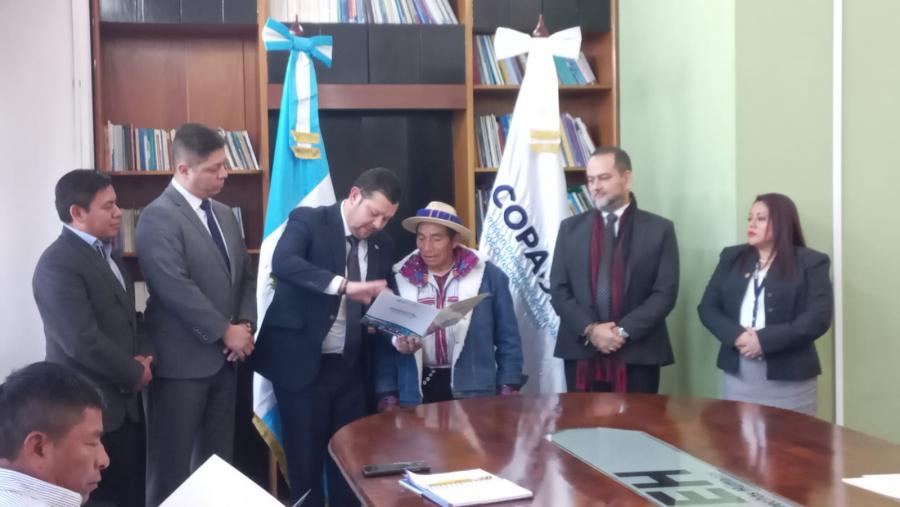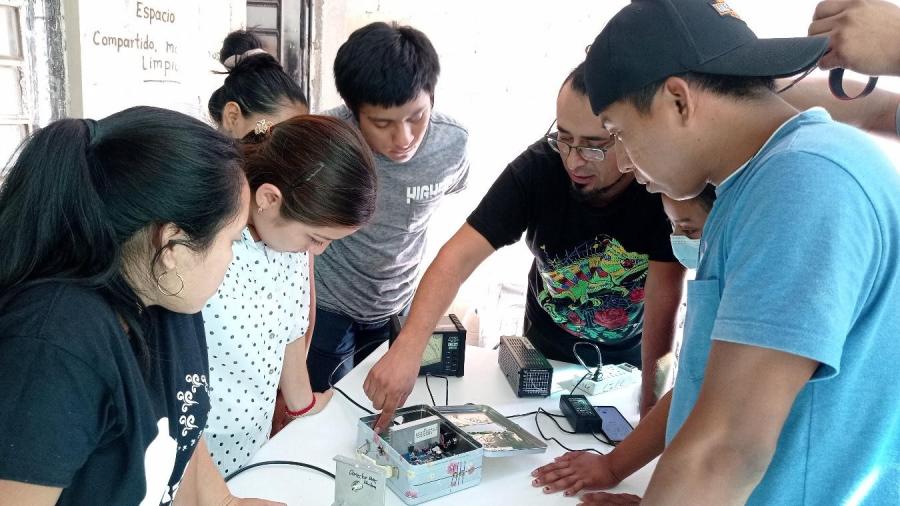
The president of Guatemala declared a state of martial law in the town of Santa Cruz Barillas, Huehuetenango, suspending civil liberties as a result of unrest in the community instigated by proposed hydroelectric project "Cambalam." The town has been invaded by 600 military and police, arrested 17 people and invaded more than 20 homes, under the pretense of combating drug-trafficking.
On May first, while walking home from the town’s fair, three men from the community of Barillas were shot by what appeared to be uniformed security forces of Hydro Santa Cruz, killing Andres Francisco Miguel and injuring two. One of the injured men, Pablo Antonio Pablo, had refused to sell his land to the company, and had received threats since 2010, which he had denounced to the human rights ombudsman. At news of the death, hundreds of community members stormed a nearby military base, demanding an answer for the death of their leader.
The following day 50 National Police units, army tanks, and anti-riot police arrived to the down, invading homes and making arrests. Newly elected President, former general Otto Perez Molina, declared the municipality to be in a State of Siege, suspending civil liberties. Hydro Santa Cruz has denied any responsibility for the death of Andres Francisco Miguel, and blames the community leaders as the “cause of confusion”. They claim that all employees of the company were “on vacation” at the time of the shooting.
A government official Mauricio Lopez Bonilla admitted that the Spanish hydroelectric company Hydro Santa Cruz, S.A. had asked the government for increased military presence on various occasions, but indicated that the declaration of a state of emergency has “no relation” to the dam. “The problem is that protests have gone to an extreme” he said.
Backstory
On June 23rd of 2007, the community of Barillas organized a referendum where 46,479 people voted unequivocally to reject mining and hydroelectric projects within their municipality. Despite this, In 2009, the Spanish hydroelectric company Hydro Santa Cruz, S.A. arrived to Barillas to explore prospects for a dam, and later began promoting the Cambalam Project. Community leaders in Barillas began to organize to call attention to the company’s plans.
The river Q’anb’alam, circling the city of Barillas, has three sequential waterfalls. Members of the community, Indigenous Q’anjobal Maya, use the river for bathing, recreation, and as a sacred ceremonial site. The runoff water is used for irrigation of agricultural crops. The community understands that with the channeling of this water throughout 2.5 kilometers of its course, the waterfalls would disappear and the surrounding environment would be greatly affected.
The company has launched legal complaints against community leaders and those who have refused to sell their land. In 2009, ten community members living along the banks of the river were charged with incitement to violence, defamation, and illegal detention. Responding to the unrest, town officials held a meeting with community members and resolved to reject the construction of the dam. Immediately following their decision, the company took legal action against the town of Barillas. The local judge ruled in favor of the company; justifying that the town has no say regarding the construction of the dam.
In June of 2011, armed security forces appeared along the banks of the river, prohibiting the movement of locals to access the waterfalls and neighbors of the river from accessing their agricultural fields. In November of 2011, after complaints to authorities about the provocations of the security guards had no avail, the community decided to take action to expel the armed forces. 23 arrest warrants were issued against leaders in the community. In January, newly elected leaders of Barillas tried one more time to negotiate with the company. Despite their efforts, five days later, heavy machinery arrived at the site.
[[{"type":"media","view_mode":"full","fid":"61036","attributes":{"alt":"","class":"media-image","height":"533","style":"width: 500px; height: 400px;","typeof":"foaf:Image","width":"800"}}]]
Reactions
As of May 13th, 17 arrests have been made for the destruction of property at the military base and for suspected drug-trafficking, yet no arrests have been made for the death of Miguel. One of the detainees includes Saul Méndez, who had also denounced threats from the company to a departmental ombudsman. Alberto Brunori, the UN High Commissioner for Human Rights in Guatemala, confirmed that he had been informed of the human rights violations and threats of violence prior to the attacks.
A group of community leaders, preferring to remain anonymous for questions of safety, explained: “Allies of the company are handing in lists of activists, and the army is coming to take them away, just as the military did during the country’s civil war. They are invading public busses, demanding ID cards in streets... The state of Guatemala continues to give concessions and licenses to foreign companies without taking into account the views and opinions of the local population that live in the area, violating Convention 169 of the ILO and the UN Declaration on the rights of Indigenous Peoples”, community leaders issued in a statement. The community views this land as part of their ancestral heritage and a source of life. “The earth is not a asset to be sold, but is Mother Earth, and sustains the existence of all of those who inhabit her.”
Government officials claim that the conflict leading to the death of Miguel arose because the individuals in question were inebriated, and that there is no evidence that the killings were committed by employees of the dam. Lopez Bonilla explained that the state of emergency responded to the series of events that made the situation ‘ungovernable’, adding “This town has always been troublesome.” Newly elected President, former military general Otto Perez Molina has justified the militarized state. During a press conference, he suggested that the conflict originated from gang-members “interested in promoting drug-trafficking and organized crime… which explains why they are seeking the removal of military from the region.” He announced May 3rd: “We have identified 100 people involved [in the drug trade], that have attempt to protect the interests of drug-trafficking and organized crime.” Residents of Barillas demand the president identify exactly where they have been storing the “tons of drugs” that he mentions, and believe that the State of Siege was planned as a favor by the government to Hydro Santa Cruz. Molina affirmed that they would not pull back the military presence nor the police.
A group of grassroots Indigenous, Campesino, and human rights organizations within Guatemala have made the following demands:
- The immediate suspension of the license for construction and operation of the Hydroelectric, Cambalam.
- The recognition of Hydro Santa Cruz as responsible for the social conflict in Barillas, and their subsequent eviction from the municipality,
- The conformation of a high-level commission, with the participation of civil society organizations, to investigate the death of Andres Francisco Miguel.
- That the government provide protection and security to the population of Santa Cruz Barillas, and rescind the suspension of constitutional rights as is established in the 1996 Peace Accords.
Update
On May 19th, after three weeks of military presence and suspended civil liberties in Barillas, President Perez Molina lifted the Martial Law, one week prior to its planned conclusion. The decision was based on the “good results” produced by measures to restore order in the western town of Santa Cruz Barillas, the president told reporters. Most of the roughly 500 army troops and 350 national police officers deployed to Santa Cruz Barillas “will begin to gradually withdraw” from the town, Interior Minister Mauricio Lopez said Friday. He added, however, that a force of up to 150 members will remain in the town “to guarantee security and avert new disturbances.” Despite a total of 17 arrests made in the community for the storming of the army base, no arrests have been made for the death of community leader Andres Francisco Miguel. The political group Oxlajuj Baktum, a broad-based committee of grassroots social activists and Indigenous rights groups declared that the end of the Martial Law is not enough- calling on the government to investigate the death, release those arrested unless they can be proved to have committed a crime, and to suspend the license of Hydro Santa Cruz due to respect for the communities right to free, prior, and informed consent under convention 169 of the ILO.



